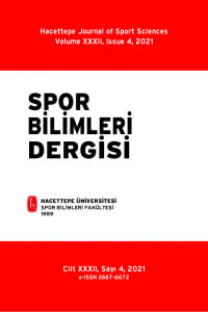Postkolonyalizm Bağlamında Türkiye’deki Sporcu Göçü
Bu çalışmanın amacı postkolonyal ilişkilerin önemli
Anahtar Kelimeler:
Spor, Postkolonyalizm, Spor Göçü
Sport Migration in the Context of Postcolonialism in Turkey
Purposes of this study were to discuss the “modernsport” phenomenon with a postcolonial criticalapproach, display the place of the sports in thepostcolonial structure through sport labour immigrationand explain the situation in Turkey. According tothis point of view, sport has built upon the old colonialstructure and economic gap between the colonyand colonialist states has deepened with this order.In sport area, worlds’ powerful economies inevitablybecame a central of attraction and it reinforced theimmigration of talents in developing countries withlow costs. Although it would be acceptable for theseindividual immigration of these talented players tothe rich countries or their big clubs which affirmed asthe holders of global sports economy means systematic“deskilling” for their home countries. On the otherhand, parallel to this postcolonial order, countrieswhich have no formal colonial ties like Turkey havesome immigrant-shaped sport branches. Also, thesecountries sport systems serve the postcolonial orderthrough allowing elder players with astronomic contracts.
Keywords:
Sport, Postcolonialism, Sport Migration,
___
- 1. Amkspor (04.10.2016). Süper Lig’de yabancı oyuncu sayısı, Türk oyunculara eşit. Erişim: http://amkspor. sozcu.com.tr/2016/10/04/super-ligde-yabanci-oyuncusayisi- turk-oyuncularla-esit-533721 2. Ashcroft B. (2009). Alternative modernities: globalization and the post-colonial. Ariel, 40(1), 81-106. 3. Ashcroft B, Griffiths G, Tiffin H. (1998). Key Concepts in Post-Colonial Studies: London: Routledge 4. Ashcroft B, Griffiths G, Tiffin H. (2003). The Empire Writes Back: Theory and Practice in Post-Colonial Literatures. London: Routledge. 5. Ashcroft B, Griffiths G, Tiffin H. (2006). The Post- Colonial Studies Reader. London: Routledge 6. Bale J, Cronin M. (2003). Sport and Postcolonialism. Berg: Oxford. 7. Bale J, Dejonghe T. (2008). Editorial. Sports geography: An overview. Belgeo. Revue belge de géographie, (2), 157-166. 8. Bale J, Maguire J. (2013). The Global Sports Arena: Athletic Talent Migration in an Interpendent World. London: Frank Cass 9. Blatter S. (2003). ‘Soccer’s Greedy Neo-colonialists’. 01.03.2017, https://www.ft.com/content/d96499dc- 3a94-11da-b0d3-00000e2511c8?mhq5j=e2. 10. Bottomore T. (1983). A Dictionary to Marxsist Thought. London: Blackwell Publishers. 11. Bowman B. (2011). Is international football migration simply another type of labour migration?.01.03.2017, http://people.bath.ac.uk 12. Büdel M. (2013). An ethnographic view on african football migrants in istanbul. Ankara Üniversitesi SBF Dergisi, 68(1), 1-20. 13. Childs P, Williams P. (2014). Introduction to Post- Colonial Theory. Oxon: Routledge. 14. Combeau-Mari, E. (2006). Sport in the French colonies (1880-1962): A case study. Journal of Sport History, 33(1), 27-57. 15. Connor JM, Griffin AL. (2009). The muscle trade: International track and field athlete mobility, colonialism and development. 01.07.2017, https://tasa.org.au/wpcontent/ uploads/2015/03/Connor-James.pdf
- Başlangıç: 1990
- Yayıncı: Süleyman BULUT
Sayıdaki Diğer Makaleler
Olimpiyat Oyunları’nda Sporcu Devşirilmesi
İrmak HÜRMERİÇ ALTUNSÖZ, Settar KOÇAK
MET Sistemi ve Dinlenik Metabolik Hızın Kestirilmesinde Sensewear Pro3 Armband’ın Geçerliği
Tahir HAZIR, Ayşe KİN İŞLER, Mehmet Gören KÖSE, Ceren İşıl ATABEY, Betül COŞKUN, Ferhat ESATBEYOĞLU
